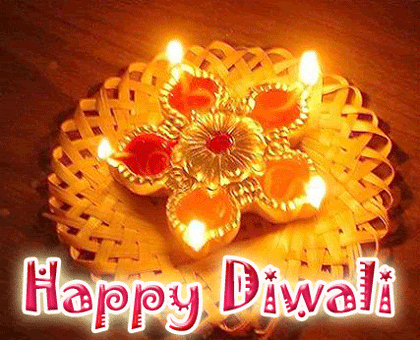

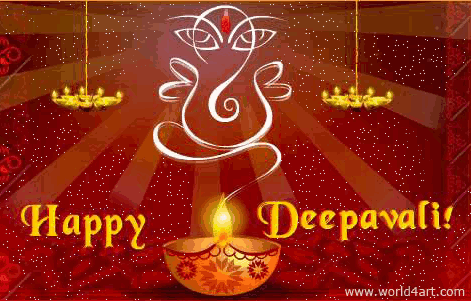








Diwali or Deepavali is the Hindu festival of lights celebrated every year in autumn in the northern hemisphere (spring in southern hemisphere). It is an official holiday in Fiji, Guyana, India, Pakistan, Malaysia, Mauritius, Myanmar, Nepal, Singapore, Sri Lanka, Suriname, and Trinidad and Tobago. One of the major festivals of Hinduism, it spiritually signifies the victory of light over darkness, good over evil, knowledge over ignorance, and hope over despair. Its celebration includes millions of lights shining on housetops, outside doors and windows, around temples and other buildings in the communities and countries where it is observed. The festival preparations and rituals typically extend over a five-day period, but the main festival night of Diwali coincides with the darkest, new moon night of the Hindu Lunisolar month Kartika in Bikram Sambat calendar. In the Gregorian calendar, Diwali night falls between mid-October and mid-November.
Before Diwali night, people clean, renovate, and decorate their homes and offices. On Diwali night, people dress up in new clothes or their best outfit, light up diyas (lamps and candles) inside and outside their home, participate in family puja (prayers) typically toLakshmi - the goddess of fertility and prosperity. After puja, fireworks follow, then a family feast including mithai (sweets), and an exchange of gifts between family members and close friends. Deepavali also marks a major shopping period in nations where it is celebrated.
The name of festive days as well as the rituals of Diwali vary significantly among Hindus, based on the region of India. In many parts of India, the festivities start with Dhanteras (in Northern and Western part of India), followed by Naraka Chaturdasi on second day, Deepavali on the third day, Diwali Padva dedicated to wife-husband relationship on the fourth day, and festivities end with Bhai Doojdedicated to sister-brother bond on the fifth day. Dhanteras usually falls eighteen days after Dussehra.
On the same night that Hindus celebrate Diwali, Jains celebrate a festival also called Diwali to mark the attainment of moksha byMahavira, Sikhs celebrate Bandi Chhor Divas to mark the release of Guru Hargobind from a Mughal Empire prison, andNewar Buddhists, unlike the majority of Buddhists, celebrate Diwali by worshipping Lakshmi.
History
Diwali dates back to ancient times in India, as a festival after the summer harvest in the Hindu calendar month of Kartika. The festival is mentioned in Sanskrit texts such as the Padma Purana, the Skanda Purana both completed in second half of 1st millennium AD but believed to have been expanded from a core text from an earlier era. The diyas (lamps) are mentioned in Skanda Purana to symbolically represent parts of sun, the cosmic giver of light and energy to all life, who seasonally transitions in the Hindu calendar month of Kartik.
Hindus in some regions of India associate Diwali with the legend of Yama and Nachiketa on Kartika amavasya (Diwali night). The Nachiketa story about right versus wrong, true wealth versus transient wealth, knowledge versus ignorance is recorded in Katha Upanishad composed in 1st millennium BC.
King Harsha in the 7th century Sanskrit play Nagananda mentions Deepavali as Deepapratipadutsava (Deepa = light,pratipada = first day, utsava = festival), where lamps were lit and newly engaged brides and grooms were given gifts.Rajasekhara referred to Deepavali as Dipamalika in his 9th century Kavyamimamsa, where in he mentions the tradition of homes being whitewashed and oil lamps decorating homes, streets and markets in the night. The Persian traveller and historian Al Biruni, in his 11th century memoir on India, wrote Deepavali being celebrated by Hindus on New Moon day of the month of Kartika.
Diwali is celebrated by Hindus, Jains, and Sikhs and some Buddhists to mark different historical events, stories but they all symbolise the victory of light over darkness, knowledge over ignorance, good over evil, hope over despair.
The mythical stories told for Diwali vary regionally and within the traditions of Hinduism. Yet, they all point to joy and the celebration of Diwali with lights to be a reminder of the importance of knowledge, self inquiry, self-improvement, knowing and seeking the good and the right path. It is a metaphor for resisting evil, for dispelling darkness and for compassion to others. Diwali is the celebration of this inner light over spiritual darkness, of knowledge over ignorance and right over wrong. It is a festive restatement of the Hindu belief that the good ultimately triumphs over evil.
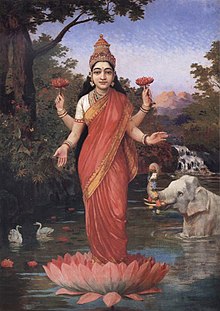
The religious significance of Deepavali varies regionally within India, depending on the school of Hindu philosophy, regional, legends, and beliefs.
Hindus across the world celebrate Diwali in honor of the return of Lord Rama, his wife Sita and his brother Lakshmana from exile of 14 years after Rama defeated Ravana. To honor the return of Lord Rama, Sita and Lakshmana from Lanka and to illuminate their path, villagers light Diyas to celebrate the triumph of good over evil. For some, Diwali also celebrates the return of Pandavas after 12 years ofVanvas and one year of "Agyatavas" in Mahabharata. Furthermore, Deepavali is linked to the celebration of Lakshmi, who is venerated amongst Hindus as the goddess of wealth and prosperity and is the wife of Lord Vishnu. The 5-day festival of Diwali begins on the day Goddess Lakshmi was born from the churning of cosmic ocean of milk by the Devas (gods) and the Asuras (demons); while the night of Diwali is the day Lakshmi chose Vishnu as her husband and they were married. Along with Lakshmi, devotees make offerings toGanesha, who symbolizes ethical beginnings and fearless remover of obstacles; Saraswati, who embodies music, literature and learning and Kubera, who symbolizes book-keeping, treasury and wealth management. Other Hindus believe that Diwali is the day Vishnu came back to Lakshmi and their abode in the Vaikuntha; so those who worship Lakshmi receive the benefit of her good mood, and therefore are blessed with mental, physical and material wellbeing during the year ahead.
Hindus in India's eastern region, such as Odisha and West Bengal, worship the goddess Kali instead of Lakshmi, and call the festival Kali Puja. In India's Braj and north central regions, the god Krishna is recognized. People mark Mount Govardhan, and celebrate legends about Krishna. In other regions, the feast of Govardhan Puja (or Annakoot) is celebrated, with 56 or 108 different cuisines prepared, offered to Krishna, then shared and celebrated by the local community.
In West and certain Northern parts of India, the festival of Diwali marks the start of a new Hindu year.
Diwali for Sikhs marks the Bandi Chhor Divas, when Guru Har Gobind freed himself and some Hindu Rajahs, from the Gwalior Fort, from the prison of the Mughal emperor,Jahangir, and arrived at the Golden Temple in Amritsar. Ever since then, Sikhs celebrate Bandi Choorh Divas, with the annual lighting up of Golden Temple, fireworks and other festivities. In the post-Guru Gobind Singh era, Sarbat Khalsa used to meet on Diwali and Baisakhi to discuss important issues concerning Sikh community.
Diwali has special significance in Jainism. Lord Mahavira, the last of the Tirthankar of this era, attained Nirvana on this day at Pavapuri on 15 October 527 BCE, on Kartik Krishna Amavasya. According to the Kalpasutra by Acharya Bhadrabahu, 3rd century BC, many gods were present there, illuminating the darkness. Therefore, Jains celebrate Diwali as a day of remembering Mahavira. On Diwali morning, Nirvan Ladoo is offered after praying to Lord Mahavira in all Jain temples all across the world. Gautam Gandhar Swami, the chief disciple of Lord Mahavira achieved omniscience(Kevala Gyan) later the same day.
The Newar people in Nepal, who are Buddhist and revere various deities in the Vajrayana tradition, celebrate the festival by worshipping Lakshmi. The Newar Buddhists in Nepalese valleys celebrate the Diwali festival over five days, in the same way and on the same days as the Hindu Diwali-Tihar festival. According to Robinson, this traditional celebration by Buddhists in Nepal, involving Lakshmi and Vishnu during Diwali, reflects the freedom granted in the Mahayana Buddhism tradition to worship any deity.
In Myanmar, a predominantly Theravada Buddhist community, two festival of lights called the Thadingyut Festival and the Tazaungdaing festival mark. One occurs before, and another after Diwali but each on full moon. These mark the events in Buddha's life, such as his return from Tavatimsa heaven. Lights decorate home and temples, and people worship at Burmese pagodas.
Diwali is a five-day festival in many regions of India, with Diwali night centering on the new moon - the darkest night - at the end of the Hindu lunar month of Ashvin and the start of the month of Kartika. In the Common Era calendar, Diwali typically falls towards the end of October, or first half of November each year. The darkest night of autumn lit withdiyas, candles and lanterns, makes the festival of lights particularly memorable. Diwali is also a festival of sounds and sights with fireworks and rangoli designs; the festival is a major celebration of flavors with feasts and numerous mithai (sweets, desserts), as well as a festival of emotions where Diwali ritually brings family and friends together every year.
Rituals and preparations for Diwali begin days or weeks in advance. The festival formally begins two days before the night of Diwali, and ends two days thereafter. Each day has the following rituals and significance:

Dhanteras (celebrated in Northern and Western part of India) starts off the five day festival. Starting days before and through Dhanteras, houses and business premises are cleaned, renovated and decorated. Women and children decorate entrances with Rangoli - creative colourful floor designs both inside and in the walkways of their homes or offices. Boys and men get busy with external lighting arrangements and completing all renovation work in progress. For some, the day celebrates the churning of cosmic ocean of milk between the forces of good and forces of evil; this day marks the birthday of Lakshmi - the Goddess of Wealth and Prosperity, and the birthday of Dhanvantari - the God of Health and Healing. On the night of Dhanteras, diyas (lamps) are ritually kept burning all through the nights in honor of Lakshmi and Dhanvantari.
Dhanteras is also a major shopping day, particularly for gold or silver articles. Merchants, traders and retailers stock up, put articles on sale, and prepare for this day. Lakshmi Puja is performed in the evening. Some people decorate their shops, work place or items symbolizing their source of sustenance and prosperity.
Narak Chaturdasi is the second day of festivities, and is also called Choti Diwali. The Hindu literature narrates that the asura (demon) Narakasura was killed on this day by Krishna, Satyabhama and Kali. The day is celebrated by early morning religious rituals and festivities followed on. This day is commonly celebrated as Diwali in Tamil Nadu, goa and karnataka. Typically, house decoration and colourful floor patterns called rangoli are made on or before Narak Chaturdasi. Special bathing rituals such as a fragrant oil bath are held in some regions, followed by minor pujas. Women decorate their hands with henna designs. Families are also busy preparing homemade sweets for main Diwali.

The third day is the main festive day. People wear new clothes or their best outfits as the evening approaches. Then diyas are lit, pujas are offered to Lakshmi, and to one or more additional deities depending on the region of India; typically Ganesha, Saraswati, andKubera. Lakshmi symbolises wealth and prosperity, and her blessings are invoked for a good year ahead.
Lakshmi is believed to roam the earth on Diwali night. On the evening of Diwali, people open their doors and windows to welcome Lakshmi, and place diya lights on their windowsills and balcony ledges to invite her in. On this day, the mothers who work hard all year, are recognized by the family and she is seen to embody a part of Lakshmi, the good fortune and prosperity of the household. Small earthenware lamps filled with oil are lighted and placed in rows by some Hindus along the parapets of temples and houses. Some setdiyas adrift on rivers and streams. Important relationships and friendships are also recognized during the day, by visiting relatives and friends, exchanging gifts and sweets.
After the puja, people go outside and celebrate by lighting up patakhe (fireworks). The children enjoy sparklers and variety of small fireworks, while adults enjoy playing with ground chakra, Vishnu chakra, flowerpots (anaar), sutli bomb, rockets and bigger fireworks. The fireworks signify celebration of Diwali as well a way to chase away evil spirits. After fireworks, people head back to a family feast, conversations and mithai (sweets, desserts).
The day after Diwali, is celebrated as Padwa. This day ritually celebrates the love and mutual devotion between the wife and husband. The husbands give thoughtful gifts, or elaborate ones to respective spouses. In many regions, newly married daughters with their husbands are invited for special meals. Sometimes brothers go and pick up their sisters from their in-laws home for this important day. The day is also a special day for the married couple, in a manner similar to anniversaries elsewhere in the world. The day after Diwali devotees perform Goverdhan puja in honor of Lord Krishna.
Diwali also marks the beginning of new year, in some parts of India, where the Hindu Vikram Samvat calendar is popular. Merchants and shopkeepers close out their old year, and start a new fiscal year with blessings from Lakshmi and other deities.
The last day of festival is called Bhai dooj (Brother's second) or Bhai tika in Nepal, where it is the major day of the festival. It celebrates the sister-brother loving relationship, in a spirit similar to Raksha Bandhan but with different rituals. The day ritually emphasizes the love and lifelong bond between siblings. It is a day when women and girls get together, perform a puja with prayers for the well being of their brothers, then return to a ritual of food-sharing, gift-giving and conversations. In historic times, this was a day in autumn when brothers would travel to meet their sisters, or bring over their sister's family to their village homes to celebrate their sister-brother bond with the bounty of seasonal harvests.
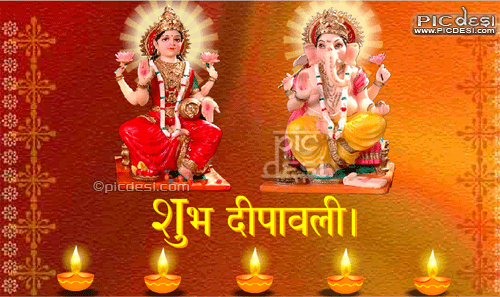
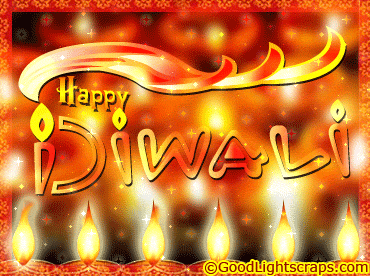

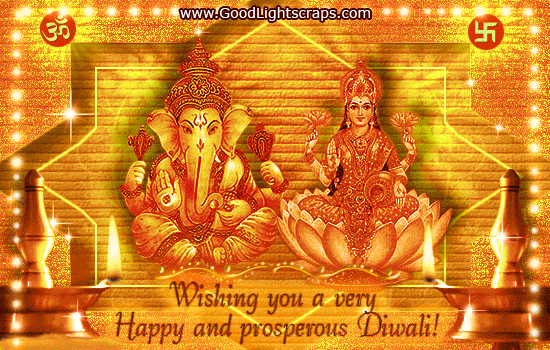
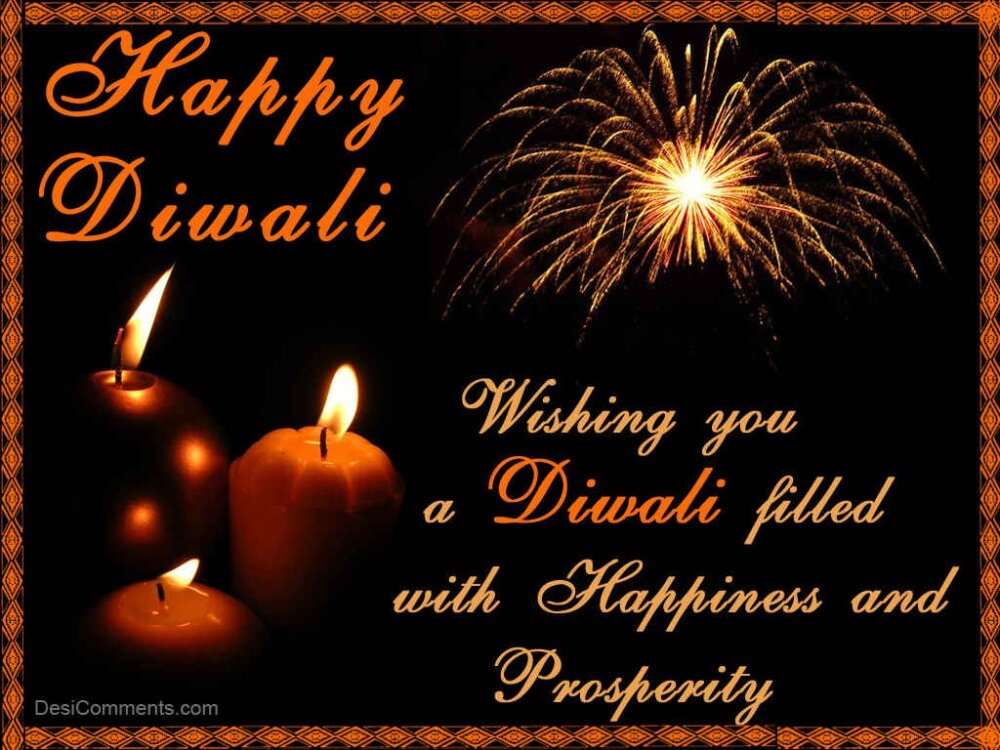
![Image result for ]\ safe diwali animated](https://www.dgreetings.com/newimages/diwali/sparkling-rows.jpg)
![Image result for ]\ safe diwali animated](https://www.happywalagift.com/wp-content/uploads/2015/11/diwali-cards-greetings-Diwali-Greetings-Cards-Wishes-Wallpapers.jpg)




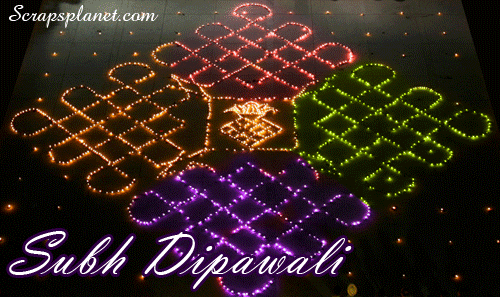

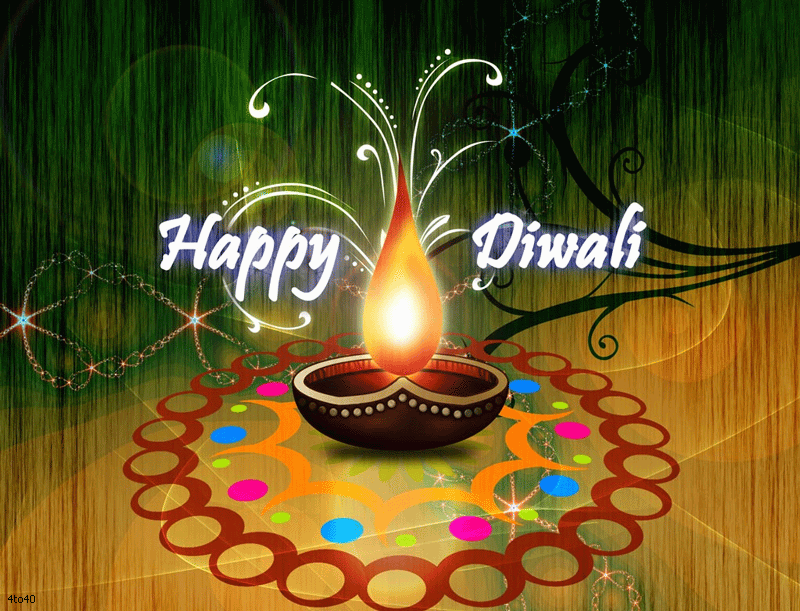
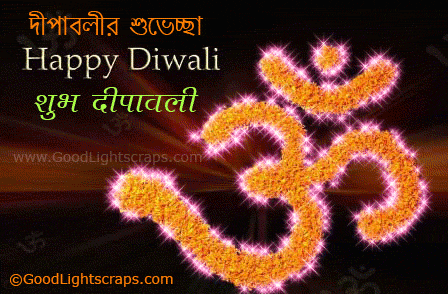
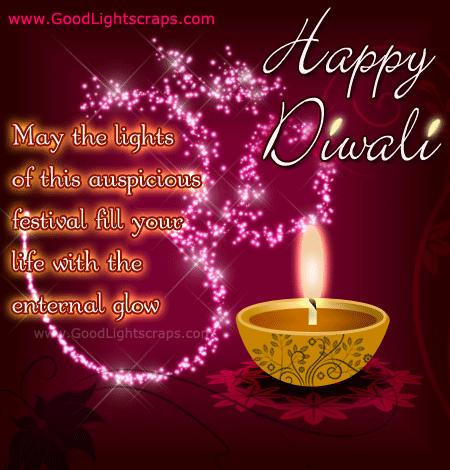
Word Count: 1



comment:
p_commentcount